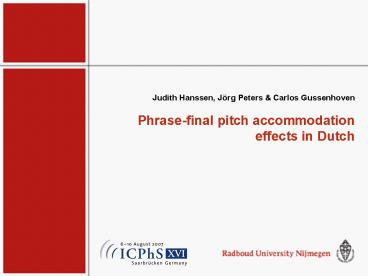Phrasefinal pitch accommodation effects in Dutch - PowerPoint PPT Presentation
1 / 16
Title:
Phrasefinal pitch accommodation effects in Dutch
Description:
Phrase-final pitch accommodation effects in Dutch. Judith Hanssen, J rg Peters ... F0 excursion. F0 duration. Research questions Standard Dutch ... – PowerPoint PPT presentation
Number of Views:22
Avg rating:3.0/5.0
Title: Phrasefinal pitch accommodation effects in Dutch
1
Phrase-final pitch accommodation effects in Dutch
- Judith Hanssen, Jörg Peters Carlos Gussenhoven
2
Phonetic variation
ICPhS XVI, 6-10 August 2007
Background Method Results Discussion
References1/15
- Variation in form of phonological pitch contours
- ? Information structure
- ? Word structure
- ? Syllable structure
- ? Paralinguistics
- ? Time pressure
- Speech rate
- Proximity of accents
- Proximity of phrase boundaries
3
Truncation and Compression
ICPhS XVI, 6-10 August 2007
Background Method Results Discussion
References2/15
- Grabe (1998a, 1998b) Grabe et al. (2000)
- Pitch accent realization in phrase-final position
in German and English / four varieties of English - Erikson Alstermark (1972) Bannert Bredvad
(1975) - Effects of vowel length on realization of Swedish
tonal accent 2
Figure 1 Schematic representation of
Compression and Truncation (from Grabe 1998a)
4
Grabe 1998 German and English
ICPhS XVI, 6-10 August 2007
Background Method Results Discussion
References3/15
- Successively less scope for voicing in
phrase-final position - Schiefer / Sheafer Schief / Sheaf Schiff / Shift
- Correlate of truncation / compression
- Rate of F0 change
F0 excursion F0 duration
5
Research questions Standard Dutch
ICPhS XVI, 6-10 August 2007
Background Method Results Discussion
References4/15
- What are the effects of time pressure on the
phonetic realization of contours in phrase-final
position? - - effects on rate of F0 change
- 2) Are the realizational effects
contour-dependent? - - three nuclear contours
- Fall, Rise, Fall-Rise
6
Experimental set-up Standard Dutch
ICPhS XVI, 6-10 August 2007
Background Method Results Discussion
References5/15
/????/, /???/, /????/, /???/
- Monosyllabic test words
- - long vs. short nucleus
- - sonorant vs. nonsonorant coda
- Three pitch accents Fall, Rise, and Fall-Rise
- Test words embedded in carrier sentences,
preceded by a context sentence - 16 speakers of Standard Dutch recorded
- - 5 male, 11 female
- - aged 18-30
7
Example sentence for Fall-Rise
ICPhS XVI, 6-10 August 2007
Background Method Results Discussion
References6/15
- Fall-Rise loom
- A Dit antieke horloge is nog van opa Thijssen
geweest. - B Het was toch van opa Loom?
- A This antique watch used to belong to
grandfather Thijssen. - B But didnt it belong to grandfather Loom?
8
Acoustic measurements
ICPhS XVI, 6-10 August 2007
Background Method Results Discussion
References7/15
- We chose the same acoustic correlate of
truncation / compression - Rate of F0 change
- F0 duration and F0 change
- Fall Rise Fall-Rise
F0 change (in st) F0 duration (in sec)
F0
Time
9
Results (1) Duration of test words
ICPhS XVI, 6-10 August 2007
Background Method Results Discussion
References8/15
- Figure 2 Duration of sonorant rime of test words
n.s.
n.s.
10
Results (2) Mean rate of F0 change
ICPhS XVI, 6-10 August 2007
Background Method Results Discussion
References9/15
- Figure 3 Mean rate of F0 change in Falls (left),
Rises (mid), and Fall-Rises (right), data grouped
for phonological vowel length and coda type - Fall Rise Fall-Rise
11
Results (3) Mean F0 change
ICPhS XVI, 6-10 August 2007
Background Method Results Discussion
References10/15
- Figure 4 Mean F0 change in semitones.
Falls Rises Fall-Rises
Duration in ms.
12
Summary of results
ICPhS XVI, 6-10 August 2007
Background Method Results Discussion
References11/15
- Choice of adjustment strategy in Dutch is
contour-dependent - Falls and Rises increase in rate of F0 change
(compression) and reduction of F0 change
(truncation) - Fall-Rises reduction of F0 change with decrease
in rate of F0 change (pitch range compression)
13
Discussion (1)
ICPhS XVI, 6-10 August 2007
Background Method Results Discussion
References12/15
- Speakers use various adjustment strategies under
time pressure, that fall in three categories - - make less effort (1,2,3)
- - work faster (4)
- - take more time (5,6)
- Six possible solutions to time pressure
- 1) Truncation with undershoot of final target
- 2) Truncation with final target present in
nonsonorant material - 3) Adjustment of range (range compression)
- 4) Adjustment of speed (rate compression)
- 5) Earlier pitch targets
- 6) Increase duration of sonorant material
14
Discussion (2)
ICPhS XVI, 6-10 August 2007
Background Method Results Discussion
References13/15
- Rate of F0 change as correlate of Truncation /
Compression - - Rate of F0 change shows the mean F0 change per
second - - It does not provide an average pitch movement
per word / contour - Alternative method of acoustic measurements
possible - - measure F0 at regular interval (e.g., every 5
per cent) to obtain clearer picture of pitch
movements
15
References
ICPhS XVI, 6-10 August 2007
Background Method Results Discussion
References14/15
- Bannert, R., Bredvad, A. 1975. Temporal
organisation of Swedish tonal accent the effect
of vowel duration. Working papers 10, Phonetics
Laboratory, Dep. Of General Linguistics, Lund
University, Sweden. - Erikson, Y., Alstermark, M. 1972. Fundamental
frequency correlates of the grave word accent in
Swedish the effect of vowel duration. Speech
Transmission Laboratory, Quarterly Papers and
Status Report 2-3, KTH, Sweden, 53-60. - Grabe, E. 1998a. Comparative Intonational
Phonology English and German. PhD thesis,
University of Nijmegen. Published in Max Planck
Institute Series in Psycholinguistics. - Grabe, E. 1998b. Pitch accent realization in
English and German. Journal of Phonetics 26,
129-143. - Grabe, E., Post, B., Nolan, F., Farrar, K. 2000.
Pitch accent realization in four varieties of
British English. Journal of Phonetics 28, 161-185.
16
THANK YOU!
ICPhS XVI, 6-10 August 2007
Background Method Results Discussion
References15/15
- Netherlands Organisation for Scientific Research
(NWO) - Joop Kerkhoff
- Frank van den Beuken
- All the participants of the experiment
Acknowledgements

